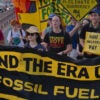
Workers clear snow from the steps of the U.S. Capitol Building on March 17 , 2014 in Washington, D.C. after a late-season overnight St. Patrick Day’s storm left 5-10 inches on the Washington Metro region. (Photo: UPI/Kevin Dietsch)
Runners in Washington’s annual Cherry Blossom Ten Mile Run this weekend will enjoy some beautiful views, as the city’s famous cherry trees bloom along the race course. Luckily, they’ll probably be spared another, almost annual event: news reports bemoaning that the blooms are occurring earlier and earlier because of climate change.
In 2012, during an unusually warm month of March, The Washington Post’s front page reported on: “a team of scientists theorizing that with drastic warming of the globe, future decades could see blossom times not just a few days early but advanced by almost a month.”
The Daily Signal depends on the support of readers like you. Donate now
Only the pace of the expected blooming had changed in 12 years: “Washington’s fabled cherry trees, along with scores of other flowering plants in the region, are blooming, on average, a week earlier now than they did 30 years ago,” the Post’s front page noted in March of 2000. It blamed “global warming—or at least warmer winter and spring nights.”
A “warmer winter” might have been welcome this year, when snow closed schools on March 17 and freezing temperatures persisted through the end of the month. But worries from 2000 proved premature: “Average global temperatures have in fact leveled off over the past 15 years,” Heritage climate experts David Kreutzer and Katie Tubb write.
That message has yet to percolate up the chain of command, though.
“Climate change can now be considered another weapon of mass destruction, perhaps the world’s most fearsome weapon of mass destruction,” Secretary of State John Kerry announced earlier this year in Jakarta. Calling for “a global solution,” he says, the world must act as one:
It’s not enough for one country or even a few countries to reduce their emissions when other countries continue to fill the atmosphere with carbon pollution as they see fit. At the end of the day, emissions coming from anywhere in the world threatens the future for people everywhere in the world.
Global action would require global cooperation. Individual countries would need to surrender sovereignty to accomplish much of anything. But what action could be taken—and at what cost?
Although climate scientists agree that the climate is changing, there is uncertainty about the extent of that change and its specific causes. The computer models used to predict climate change have been notoriously inaccurate.
>>> Read More, Did Climate Change Cause the California Drought? Or Big Government?
But Kerry wants us to act locally. “International negotiations have centered on placing the economic burden of addressing climate change on a handful of developed countries,” Heritage energy expert Nick Loris points out, “while asking nothing from more than 100 developing countries, where greenhouse-gas emissions are soaring.”
Yet unless major economies, including developing economies, reduce emissions—something they have steadfastly opposed because it would curtail economic growth—there will be no meaningful impact on emissions.
This year’s cherry blossoms are right on time. That’s not news. But then, neither is climate change.





























